For pristine stargazing, join Houston Astronomical Society’s monthly star parties (Bortle 3), Texas Astronomical Society’s Oklahoma gatherings, or visit Somerville Lake (Bortle 3) and Houston’s dark site near Columbus (Bortle 4). Brazos Bend State Park offers Bortle 4-5 viewing, while Greater Big Bend Reserve provides exceptional astrophotography opportunities. Newcomers can access telescope loaner programs at many meetups. You’ll find expert guidance, hands-on demonstrations, and welcoming communities at these celestial gatherings.
Finding True Dark Skies: Bortle Scale Measurement Locations
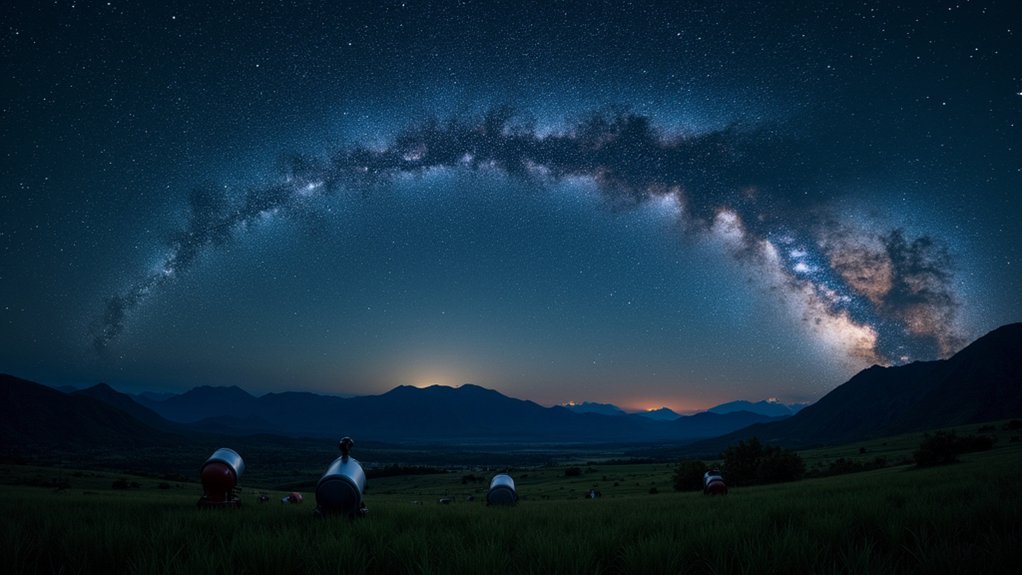
When you’re serious about stargazing, understanding the Bortle Scale becomes essential to your success. This 1-9 classification system helps you identify locations with minimal light pollution, where Class 1 represents pristine dark skies and Class 9 indicates inner-city brightness.
For Houston-based astronomers, several dark site options exist within a two-hour drive. Somerville Lake offers a Bortle Class 3 rating, providing excellent visibility of numerous celestial objects.
The Houston Astronomical Society’s dark site near Columbus achieves a respectable Class 4, where you’ll still see the Milky Way and many deep-sky phenomena. Brazos Bend State Park, with its observatory and Bortle 4-5 rating, provides another option, though it may exceed the two-hour travel limit.
True stargazing success depends on finding locations rated 1-2 on the Bortle Scale when possible.
Houston Astronomical Society’s Monthly Star Parties
You’ll find expert members serving as celestial guides at Houston Astronomical Society’s monthly star parties, helping you navigate the night sky and identify objects through telescopes.
These dark sky gatherings offer valuable community learning opportunities through structured discussions and informal knowledge sharing among fellow astronomy enthusiasts.
The collaborative environment encourages you to ask questions, share observations, and deepen your understanding of astronomical phenomena in real-time.
Navigation and Celestial Guides
Under the dark Texas skies, the Houston Astronomical Society‘s monthly star parties transform amateur stargazers into skilled celestial navigators.
You’ll learn to use the Big Dipper as your primary guide through the spring night sky, helping you locate various stars and constellations with confidence. These star parties near Columbus, Texas offer minimal light pollution, creating ideal conditions for spotting celestial objects.
- Access HAS telescopes and equipment to enhance your viewing experience
- Develop practical navigation skills through hands-on observational activities
- Connect with fellow enthusiasts who share your passion for the cosmos
- Participate in specialized workshops designed to improve your stargazing abilities
The society’s resources make navigation accessible for all skill levels, turning what might seem overwhelming into an engaging communal journey through the universe.
Community Learning Opportunities
The Houston Astronomical Society doesn’t just help you navigate the night sky—they create a vibrant learning community for astronomers of all levels.
Their monthly star parties coincide with the new moon, offering ideal dark-sky viewing conditions for everyone involved.
These gatherings exemplify effective community outreach, welcoming both members and the public to observe celestial wonders through various telescopes. You’ll find experienced astronomers enthusiastic to provide hands-on assistance with equipment operation—invaluable for newcomers still learning the basics.
Membership in astronomy clubs like HAS delivers tangible benefits beyond access to star parties. You’ll receive guidance on telescope selection and usage in a supportive environment where knowledge flows freely.
Don’t forget to bring your binoculars, telescope, camera, and red light to maximize your experience at these educational events.
Texas Astronomical Society’s Dark Site Gatherings
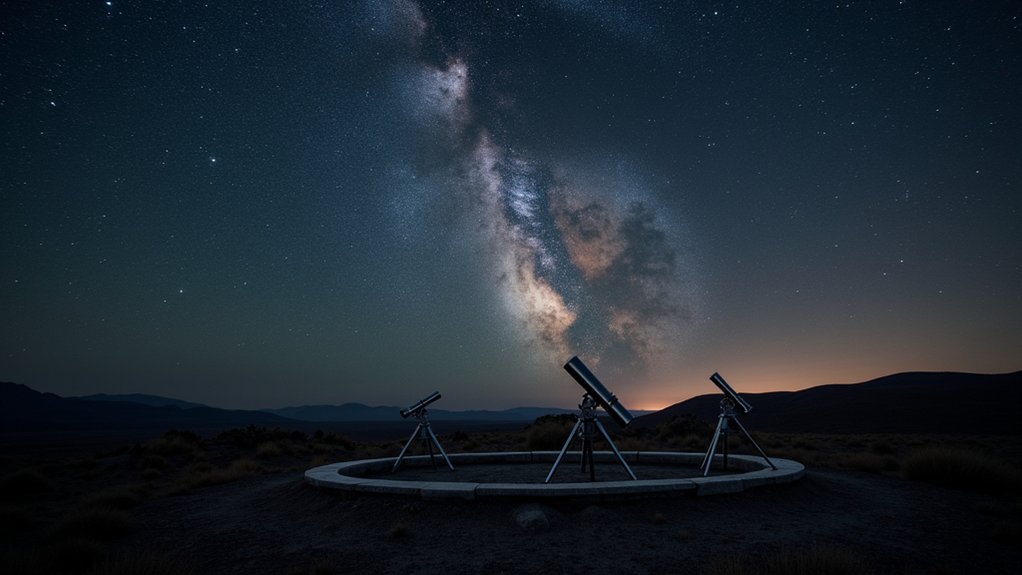
For serious stargazers seeking pristine night skies, TAS offers an exceptional opportunity through their monthly dark site gatherings near Atoka, Oklahoma.
You’ll find these meetings scheduled around new moons, maximizing visibility for your astronomical pursuits. To join these star parties, you’ll need a $36 annual membership and must pass a 12-question test, with a two-month waiting period before accessing the dark site.
Maximize your stargazing during new moons – just a membership, simple test, and brief waiting period to access truly dark skies.
- Bring your own equipment: telescopes, binoculars, cameras, and red lights
- Connect with fellow astronomy enthusiasts who share your passion
- Learn from experienced observers in a supportive community environment
- Experience truly dark skies away from city light pollution
The well-appointed location provides everything you’ll need to advance your stargazing skills while enjoying the camaraderie of like-minded space enthusiasts.
Telescope Loaner Programs for First-Time Attendees
You can borrow quality telescopes through H.A.S. Library’s Loaner Program if you’ve been a member for at least two months, with initial loans lasting 30 days and renewable for up to 60 more.
The program offers several telescope options including 10″ and 8″ Zhumell dobs, complete with “Nightwatch” guide and eyepieces to help you navigate the night sky.
This “try before you buy” approach lets you practice stargazing skills and determine which equipment best suits your needs before making a personal investment.
Borrowing Equipment Guidelines
New attendees without their own equipment can still enjoy the wonders of the night sky through our generous telescope loaner program.
The H.A.S. Library Telescope Loaner Program allows members in good standing for at least two months to borrow telescopes for 30 days, with renewal options up to 60 additional days.
- Each telescope comes with “Nightwatch” by Dickinson and two eyepieces to enhance your stargazing experience.
- Choose from various models including Zhumell 8″ and 10″ dobs, Orion Astroview 6″ newtonian, or Seestar.
- You’ll have access to quality equipment without the initial investment, perfect for beginners.
- Borrowed equipment can be used during club events, helping you develop observational skills alongside experienced members.
Try Before You Buy
While purchasing your own telescope represents a significant investment, our special “Try Before You Buy” program lets first-time attendees experience various telescope models without financial commitment.
After just two months as members in good standing, you’ll gain access to our telescope loaner programs offering equipment like 10″ Zhumell Dobsonians and 6″ Orion Astroview Newtonians for 30-day periods.
Each loan includes Dickinson’s “Nightwatch” guide and two eyepieces to enhance your stargazing experience.
Need more time? You can renew for up to 60 days total, giving you ample opportunity to test different models before making your purchase decision.
Beyond equipment testing, these programs foster valuable community connections, allowing you to learn alongside fellow astronomy enthusiasts who share your passion for exploring the night sky.
Navigating Seasonal Night Skies With Expert Guides
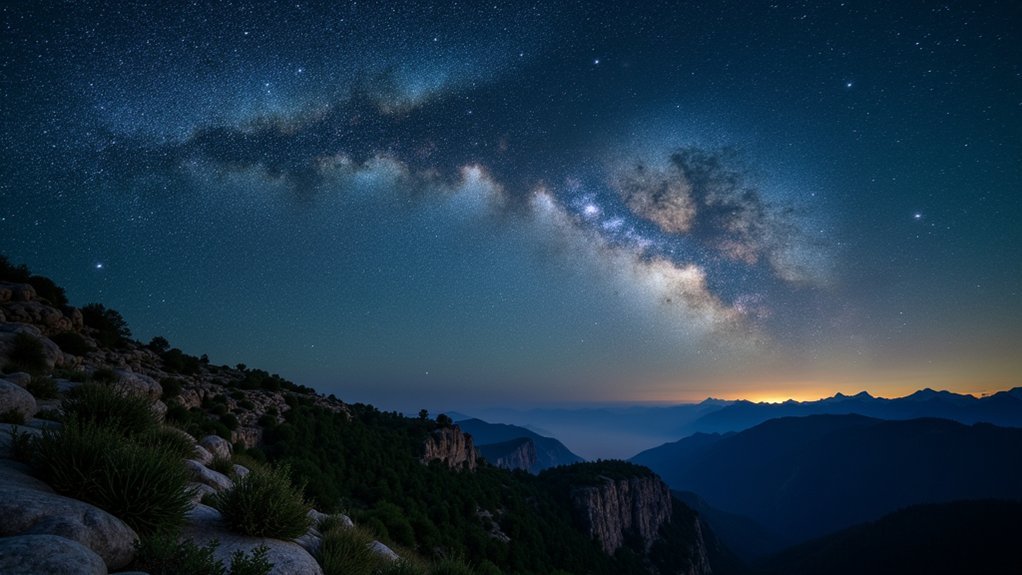
As the seasons change, so do the celestial tapestries overhead, making expert guidance invaluable for both novice and experienced stargazers.
The Houston Astronomical Society’s monthly meetings feature astronomy experts like Chris Morrisette, who’ll teach you to navigate the spring night sky using the Big Dipper on April 3rd, 2025. These guest speakers provide practical techniques for locating seasonal celestial objects using star charts and reference points.
- Learn to identify seasonal constellations and their historical significance across cultures
- Discover how to track celestial objects as they shift positions throughout the year
- Master the use of star charts to locate specific galaxies, nebulae, and star clusters
- Apply navigation techniques during hands-on Novice Labs and observing sessions with borrowed telescopes
Astrophotography Opportunities at Protected Dark Sites
For serious astrophotographers seeking pristine night skies, protected dark sites offer unparalleled opportunities to capture the cosmos in stunning detail. The Greater Big Bend International Dark Sky Reserve provides ideal conditions to photograph celestial objects like the Antenna Galaxy without light pollution interference.
| Dark Site | Astrophotography Benefits |
|---|---|
| HAS Columbus | Member telescopes including 10″ Dobsonian |
| Big Bend | Minimal light pollution for deep sky imaging |
| Monthly Meetups | Equipment sharing and technique feedback |
| SIG Sessions | AP Target of the Month discussions |
| Community Events | Collaboration with experienced photographers |
You’ll find these locations particularly valuable during monthly astrophotography sessions where you can refine your techniques alongside fellow enthusiasts. The community events foster knowledge sharing, while organization-maintained equipment guarantees you’ll capture breathtaking images even without personal gear.
Community Outreach Events at Nature Preserves and Observatories
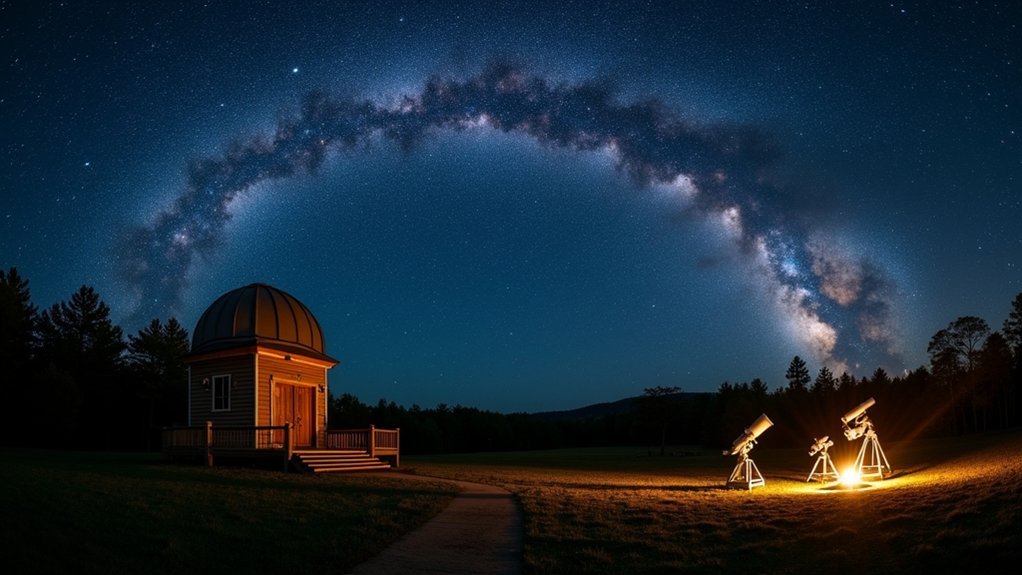
The love of astronomy extends far beyond dedicated enthusiasts through vibrant community outreach events at nature preserves and observatories.
The Houston Astronomical Society regularly hosts programs where you’ll experience hands-on demonstrations like the cosmic distance ladder featured at Kleb Woods Nature Reserve’s upcoming March 2025 event.
These gatherings offer exceptional opportunities to:
- Connect with experts while viewing celestial objects through professional telescopes
- Learn about dark skies preservation efforts like the Greater Big Bend International Dark Sky Reserve
- Participate in interactive astronomical education suitable for all knowledge levels
- Join a diverse community of stargazers sharing the wonder of the night sky
Community engagement flourishes at these locations, creating the perfect environment for newcomers and experienced astronomers alike to celebrate our cosmic heritage.
Frequently Asked Questions
What Should I Wear to a Nighttime Stargazing Meetup?
For a nighttime stargazing meetup, you’ll want to dress warmly in layers. Bring a hat, gloves, and insulated shoes. Don’t forget a red flashlight to preserve your night vision while moving around.
Are Children Welcome at Dark Sky Stargazing Events?
Children are welcome at most dark sky stargazing events. You’ll want to check each event’s specific age policies, as some might require kids to stay with parents or have minimum age requirements.
How Do I Protect My Night Vision During Meetups?
You’ll protect your night vision by using red flashlights, avoiding bright phone screens, and giving your eyes 20-30 minutes to adjust. Don’t look at white lights, and consider wearing red-lens glasses during breaks.
What Happens if There’s Cloudy Weather on Meetup Night?
If it’s cloudy on meetup night, you’ll typically get a cancellation notice. We’ll often reschedule or move to an indoor astronomy presentation instead. Check your email or our group chat for updates.
Can I Bring My Own Telescope or Binoculars?
Yes, you’re absolutely welcome to bring your own telescope or binoculars! We encourage members to share their equipment and knowledge. It’s a great opportunity to learn about different viewing tools and techniques.
In Summary
You’ll discover a whole new dimension of the cosmos when you attend these monthly dark sky events. Whether you’re borrowing a telescope, learning from seasoned stargazers, or capturing celestial wonders through your camera, these gatherings offer unparalleled access to truly dark skies. Don’t miss your chance to connect with fellow astronomy enthusiasts while experiencing the night sky as our ancestors did—brilliantly illuminated and awe-inspiring.
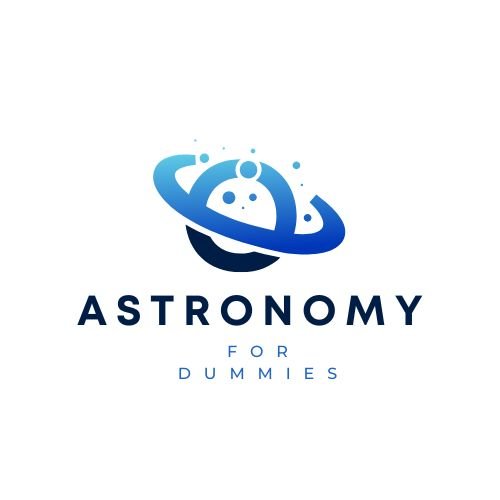
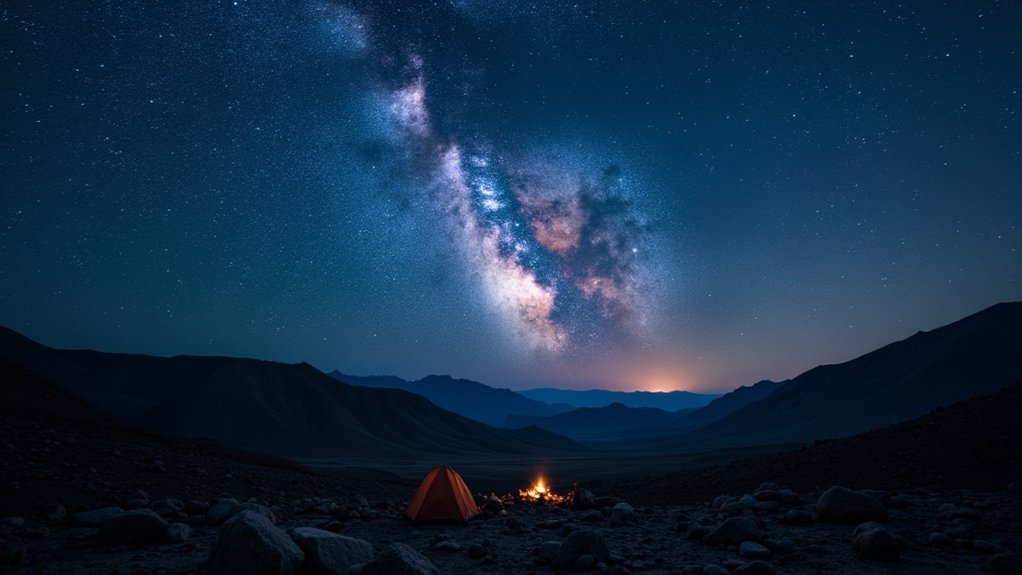
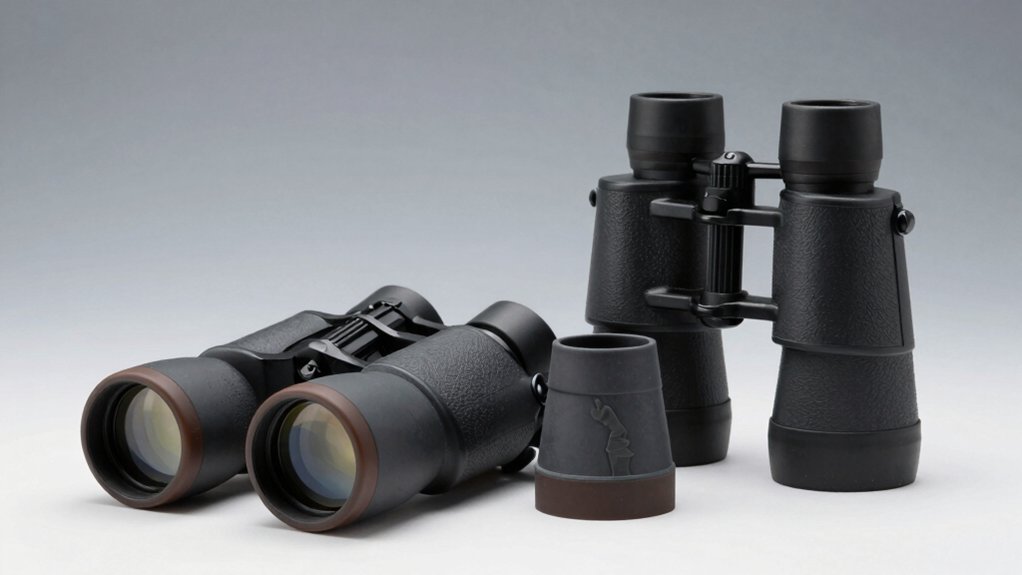
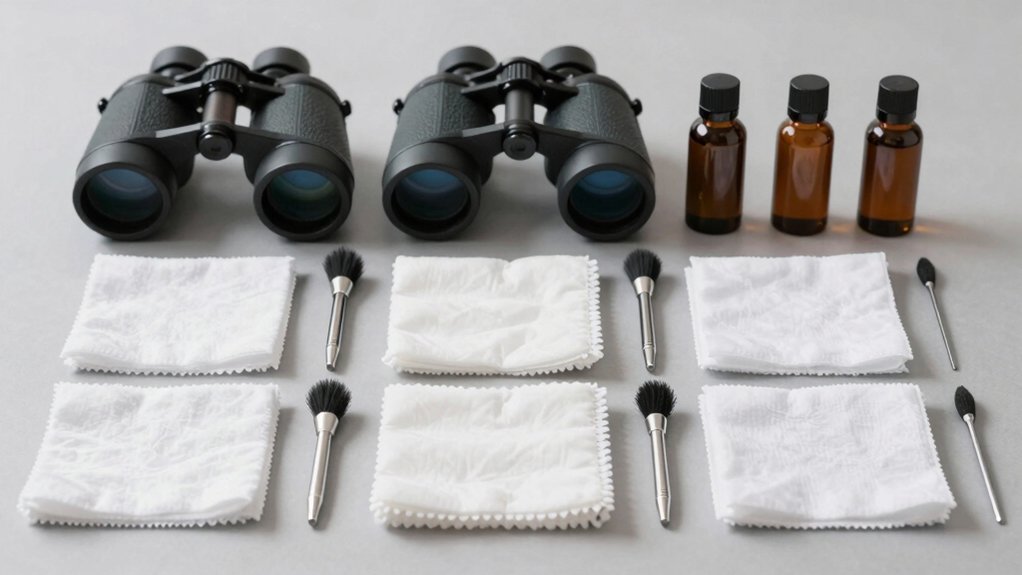
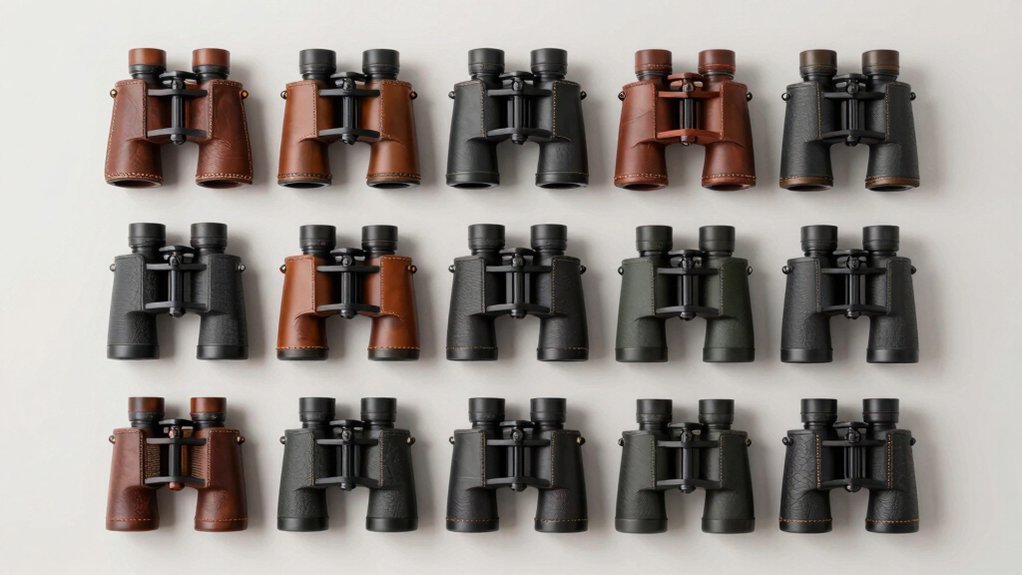
Leave a Reply